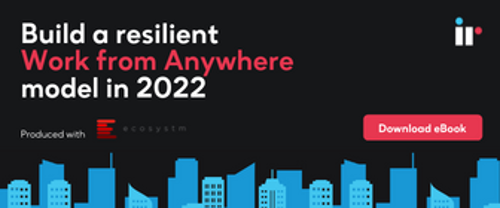Nobody could have predicted the events that would change a global working culture and open the gates for a flood of new technology, new ways of thinking – and new challenges.
In our new eBook, ‘Build a Resilient Work From Anywhere Model in 2022’, produced in conjunction with Ecosystm, the message is crystal clear; the hybrid working model that has emerged since the beginning of the pandemic is here to stay and success will depend on having the right strategies in place.
Recalibrating the hybrid work model
Ecosystm research revealed that 38% of employees now work from a location of their choice, and employees are wanting more flexibility to choose where they work from, and when.

This means organizations are increasing their investments in tech, videoconferencing, digital and collaboration tools, requiring them to build robust hybrid working infrastructures that enable working from anywhere.

Underpinning this new tech investment is the importance of managing and securing the performance of your network, endpoints, applications, and digital technologies.
Common challenges of hybrid work
Given the disparate nature of the hybrid working model, it’s important to look at an organization’s entire environment and infrastructure from a holistic point of view. The ability to see every issue through a single lens is imperative due to factors like:
- Interoperability – and the use of multiple platforms and technologies
- BYOD – most employees prefer to use their own devices and apps
- Feedback issues – and the lack of a central reporting function
- Call issues – caused by incompatibility, faulty devices, and apps etc
- Security – and the risks and vulnerabilities with multiple apps, devices, and networks
The importance of innovation
Organizations are continuing to find the way that works for them, experimenting with how their environments will function best. They may find that legacy tools and technologies are no longer suitable. Current office workspaces may become redundant.

Success rides on a willingness to introduce changes to organizational culture, communication, collaboration, and experience management will be top considerations.
Reinventing the physical workplace
Physical office spaces will still have their place in workplace culture, but they will need a re-design that focuses on driving a seamless user experience – and integrating the appropriate technology for every setting.
- The use of huddle rooms and flexible collaboration spaces will increase.
- There will be a need for a constant interplay between the home and office environments.
- There must be a focus on audio quality and device interoperability, so that participants have a good experience regardless of location.

The importance of UC monitoring
Given the complexity of a multi-vendor, multiple network, and BYOD hybrid working environment, having an end-to-end monitoring system is crucial.
Acquiring an adaptable tool that can monitor and troubleshoot across different vendors and systems is the first step in creating a streamlined hybrid working environment.

The right performance management solution is essential to:
- Help you understand which devices are not performing at optimum level
- Create alerts to vulnerabilities
- Supply reports and analytics across the board
- Ensure system updates to prevent software issues
Find out how to plan your hybrid work strategy properly to get you closer to what our desired hybrid working outcomes should look like.





